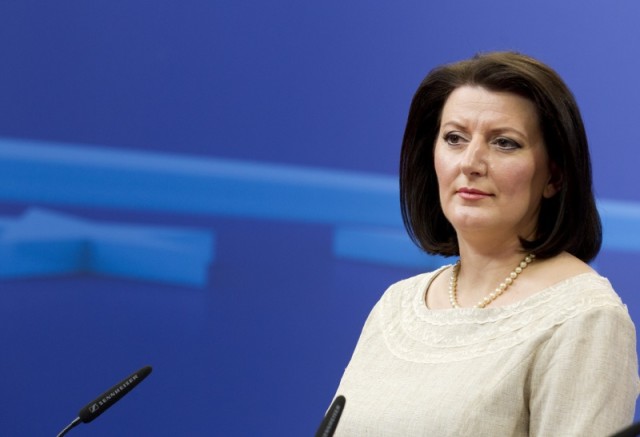By RFE RL
(RFE/RL) — President Atifete Jahjaga has said in a televised address that Kosovan independence was “irreversible” and that “the republic of Kosova is an irrefutable reality.”
Speaking on February 17 as Kosova began marking five years since it broke away from Serbia, she also claimed that Kosova had become “an important contributor in developing regional relations” and that joining the EU and NATO was now the country’s “clear goal.”
“We, the people of Kosova, have begun a new chapter in our history, the chapter of peace, understanding, cooperation and mutual respect,” she said.
Jahjaga was speaking at a military parade by the military parade by the NATO-trained Kosova Security Force (KSF).
Celebrations to mark the anniversary are planned throughout the day, including a special session of parliament and concerts along the main boulevard in Prishtina, ending with a fireworks display later in the evening.
Skender Ahmeti, a Prishtina resident and former member of the Kosova Liberation Army, told RFE/RL why he felt it was important to mark the anniversary.
“I feel extremely good, we waited for this day for so long and every year I have emotions on this particular day,” he said. “All of our expectations have not been fulfilled, but it’s still all right. If we compare things to how we were thirteen years ago, for me it is a dream come true.”
Almost 100 countries have recognized Kosova since ethnic Albanians proclaimed independence on February 17, 2008.
The declaration came a decade after the 1998-1999 Kosova conflict, which ended with a NATO bombing campaign against late Serbian strongman Slobodan Milosevic’s forces.
Belgrade still considers the region its southern province, but EU-led talks which began in March 2011 led to a recent thaw in relations, and the two presidents held their first talks in Brussels on February 6.
With Serbia’s EU membership dependent on improving ties with Prishtina, Prime Minister Ivica Dacic hinted last month that Belgrade may give up its opposition to Kosova’s long-held goal of joining the United Nations.
But Dacic has said the “most difficult part of this dialogue is ahead of us” in order to reach agreement with Prishtina on the integration of the Serb minority.
Belgrade hopes for some autonomy for the 120,000 Serbs who refuse to recognize the ethnic Albanian authorities.
According to Tanja Jaksic, a Serbian woman living in the northern part of Mitrovica, people in the north have lived in uncertainty since the declaration of independence.
“It’s a daily fear of what will happen with us,” she said. “It’s a daily problem because we don’t like to live in an independent Kosova. On a personal level, we don’t have problems with our neighbors, but on a political level, yes – there is a problem.”
Elsewhere, economic hardships were in many residents’ minds as they celebrate independence.
“One may have many wishes and expect maybe more, but we also have to recognize that maybe the possibilities are limited,” said Mire Deva, a Kosova Albanian from Prishtina. “I hope for a better situation in the future, working all together.”
More than a third of Kosova’s 1.8 million people live on less than a dollar a day and gross domestic product per capita is one of the lowest in Europe at 2,600 euros a year, according to the World Bank.
